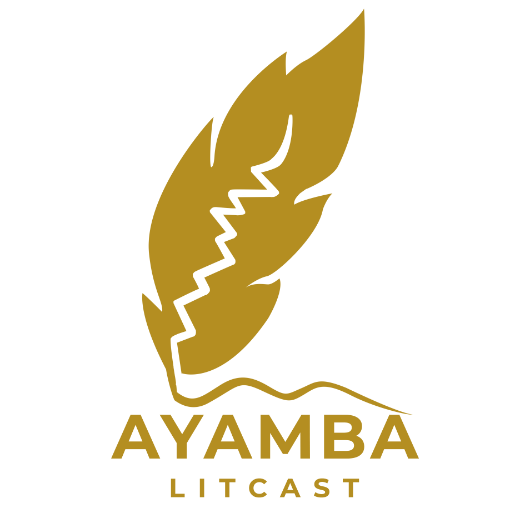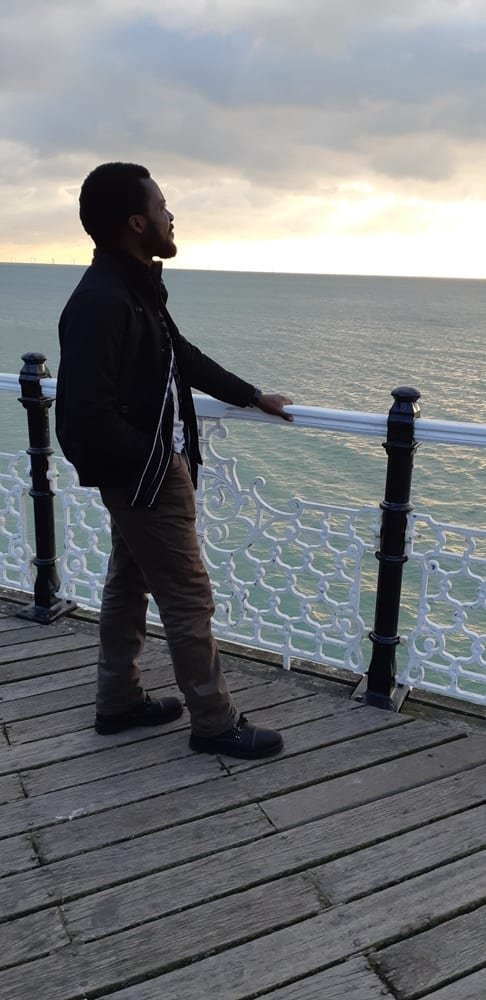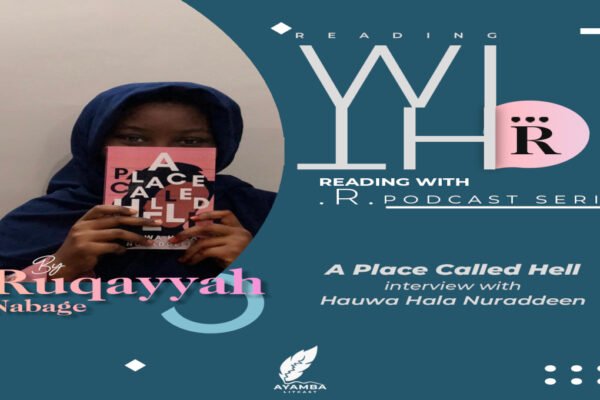Hauwa Shaffii Nuhu in conversation with Su’eddie Vershima Agema
This interview was conducted in April, 2019.
“Writing chooses you, grows on you and then torments you when you do not indulge it”
Ayamba: First of all, why did you choose writing? In a world where there is so much ache and injustice, so much suffering both internal and outward, you have taken up the difficult task of being the voice of it all. You could have gone into football, or business, or just anything that actually pays. But here you are a writer. Why?
Su’eddie: Why are you yourself writing? It is something that chose us, perhaps. Not so? You just find it growing on, tormenting you when you don’t follow its path. You try to do any other thing but somehow find yourself…writing.
I grew up into a creative tradition. I have spoken much about this. Of how I had an oral tradition of storytelling handed me by my father. My mother bought me the best of the Heinemann series. But the direct effects of having siblings who drew comics – from Gabriel and Theodora, to Taver and Sever Ayede, meant I had to start drawing my comics to complete it.
I have been doing creative runs since secondary school and growing in various forms. I have also done lots of journalism but had to stop at some point in 2011 after a serious personal tragedy.
Ayamba: Wow. You had a most conducive community from family that helped shape you. That’s beautiful, because writing often is a solitary pursuit.
Journalism, I’ve always loved journalism especially when it’s done unconventionally. And lately, journalists have found a way to bring storytelling into reporting and that’s simply thrilling. I’m sorry to hear that you stopped. Do you hope to maybe return to it sometime in future?
Su’eddie: The future is what it is; that dark tunnel which we have no idea of. One which we have hopes and plans for, which eventually turn out as it would. I would let the future decide that… And that is in relation to active regular journalism.
On another note, I am still doing a lot of op-eds. I believe in actively engaging on issues that are pertinent in society. I believe that the way forward is always about creating discourses while also working towards taking care of what ills we see.
So, on the one hand, I am still doing my journalism but not as formally as I used to.
Ayamba: That’s great to hear. I hope that the future features more of journalism somewhere in its belly for you. There’s a question I’ve always wanted to ask you. Your name. It’s beautiful. What does it mean?
Su’eddie: Which of them? I have a long list of names.
Ayamba: Really? Let’s start with Su’eddie.
Su’eddie: In full, the comb-form has an affinity with my full Tiv name which translates to: ‘Put your trust in God and nothing will ever surpass you.’ We have a short form there. But, basically, that’s it.
Ayamba: Oh wow. Tiv names have a way of always sounding rare and beautiful at the same time. I remember doing a short story and wanting to use rare names. I immediately sought Tiv names. I texted Tj Benson to supply me. Lol. And that’s the thing with culture, it is beautiful. Do you incorporate cultural or traditional practices in your stories?
Su’eddie: Have you read any of my stories?
Ayamba: Hahaha of course I have. I’ve read your collections. But that’s years ago. Do you incorporate them into any recent writings?
Su’eddie: I can send you some of my recent stories and let you decide.
Ayamba: Yayyyy. Sister privilege!
Su’eddie: I don’t force it, but somehow I find it just come in. It isn’t just my stories, my poems too. I was discussing with the poet, Daisy Odey, my friend and collaborator on projects only recently on how Hyginus Ekwuazi had accused me at some point of overdoing it. Maybe. You know I found Post colonialism in my final year in the university and it affected my writing. Before then, my early teachers like Professor Moses Tsenongu, Dr Andrew Aba and Dr Maria Ajima had somehow schooled me into a certain model of writing – which I outgrew later – but which somehow had culture and tradition somewhere in it. Being abroad has a way of also making you treasure certain things more.
So, to answer you after the plenty grammar, yes.
By the way, I should mention that two people who greatly motivated my growing change in writing are Sam Ogabidu, a friend who was ANA Chairman in Benue then. I was an undergrad and also a member of the EXCO; and importantly, Professor Ekwuazi who remains a great friend and inspiration.
Ayamba: I’ve been thinking a lot about culture and traditions that are beautiful, and how when incorporated into creative writing, adds flavour and beauty to the work.
I keep saying that models are important. But some people argue that models might influence one’s writing and one might end up with a cloned voice. What do you think about that?
Su’eddie: Well, you can have models or if you don’t want to use that word, people you look up to who have no influence on your work, in the strict sense of it. We all need people to help lift us up, to inspire us on dark roads and be that example when the storms get too rough. In working with these people or them working with us, we do not necessarily even need to follow their styles. I am not a big fan of cloning anyone or of following in people’s literary steps per se. I think we all have our own voices and our narratives. We can grow them. But remember too, that in growing, we need a process. Maybe I should make it clear here that when I spoke of my growing change, I don’t mean I became like Ekwuazi or Sam. After reading Ekwuazi and our becoming close, I discovered new ways of exploring my thoughts. I daresay that any similarity in our works is minimal and almost non-existent. Same thing with Sam. Sam Ogabidu hardly puts his writing out, so where would I even have seen it? 😂
We need our clans as we grow. That’s what these guys were to me. My big brothers. I have met many other people who have affected my writing. See even my wife, Agatha. Daisy. Romeo. TJ. Chimamanda Adichie and Helon Habila. The list is endless. What more can I say on this? Did I rant too much on this question? Let’s grow on but let’s also be careful on how we grow lest we lose ourselves.
Su’eddie: I guess the final thing I am saying before the line on ‘Let’s grow’…is, we can have models, I shudder at that word. We can have friends or people who inspire us; real or in books, who teach us. And yet, we wouldn’t lose our voice.
Ayamba: This is absolutely succinct, Su. You put it so well. I believe that if a writer in their foundational stage is sounding like a writer they are studying or relating with, it is all part of the learning and growing process. The beauty of it is that at the end of the stage, their own true voice would have emerged out of all the mentoring and reading. Thank you for this word.
Su’eddie: You have captured it well.
Ayamba: Now, away from writers who have helped shaped you as a writer, what books have also shaped you?
Su’eddie: Loads of books. Loads of stories. And it isn’t only writers that shaped me. My father was not a writer! My foster father, Mr. Charles Ayede was not a writer. My siblings aren’t strictly writers in that sense. My mum isn’t a writer. Mr. Mbatsavde Emmanuel and Mr. Ihongu who taught me Literature in school aren’t writers…
Ayamba: I agree that sometimes, the people who shape our writing journeys most times aren’t even in the journey themselves. And it’s a wonder.
Su’eddie: But you have asked about books, so let’s talk books. There are loads of them. I have lost the names of many which I read when I was much younger. (Since I am still young) I cannot begin to call all now. The Bible was a key influence though. In my earlier writing, I liked to write like the New Testament. Where you don’t have so much descriptions. You can’t really see what Jesus or the disciples looked like or of many characters. You have to use your imagination to conjure them. But I eventually changed. I learnt how to use the third person point of view from one of Chimamanda’s stories. I can’t remember which now. I think ‘Cell One’ or so. It was at a time when she wasn’t so much of a big celeb as she is now. I found her in Purple Hibiscus and in short stories scattered here and there. To other books, there is A Pillar of Iron by Taylor Caldwell, Habila’s Measuring Time – which I think is his best book.., Shadow of the Wind by Carlos Ruiz Zafon, the works of Shakespeare, the comics of Tardoo Ayua, to mention a minute few. It goes without saying that reading Ekwuazi’s poetry really shaped a vision of writing for me. All these books have helped me learn more about life and also of possibilities with writing. I have been able to build on them and while I have forgotten the stories of some, the style of others reside somewhere in me, there is that added skill.
Ayamba: Thank you so much for this list, Su. And thank you so much for talking to me. As a final word, what would you say to that writer who because she has not written in a while, is contemplating whether or not she’s still a writer? Whether her gift has flown with the wind?
Su’eddie: The key thing is to hold on. As long as we hold on the torch of hope, moving on through every darkness in faith, we will come to the light. Writing is in us. Let’s keep the faith and never lose hope.
Ayamba: Thank you, Su.
Sueddie Vershima Agema is President of African Writers at the University of Sussex where he’s a Chevning scholar studying for a Master’s degree in international education and development. He is the author of four poetry collections including Home Equals Holes: Tale of an Exile (Winner, Association of Nigerian Authors Poetry Prize 2014 and Nominated for the Wole Soyinka Prize for Literature 2018), a childrens book, Once Upon a Village Tale (Shortlist, The ANA Prize for Childrens Literature 2018) and a short story collection, The Bottom of another Tale (Shortlist, Abubakar Gimba Prize for Short Stories 2015). Sueddie also won the Mandela Day Short Story Prize (2016). He was listed on Nigerian Writers Awards 100 Most Influential Nigerian Writers under 40 (2017 and 2018).
The interviewer, Hauwa Nuhu Shaffii has her bio in the members’ profile section



